Verapaz means “true peace”. The neighboring Guatemalan departments of Alta and Baja Verapaz are so named because of the warlike Achí Maya, who like the Apache in the US stubbornly refused to be conquered until long after the rest of the country. When they finally did submit, it was because of the spread of religion, not the sword.
This is a story of breakdown and redemption, in which I strive again and again to interrogate and dismantle my assumptions only to find more awaiting beneath, until finally, mental and physical resources spent, I give up hope, only to be lifted up and saved by human kindness.
Before the dawn of January 25th in the mountainous jungle town of Lanquín, Alta Verapaz, I cursed out a small crowd of self-important American adventure tourists packed into a rickety minibus bound for Antigua. That evening, I danced goofily (the only way I know how) with a small crowd of teenage Achí Mayan girls to a marimba band at a saint’s day fair in the desert valley town of Rabinal, Baja Verapaz, then fell asleep on a cardboard pallet on their kitchen floor long past midnight on the 26th. These were serious breaches of character for me. I get angry, but I never vent it at other people no matter what kind of assholes they are; I bottle it up, then expel it into exertion or prose. I dance in public only under duress or the influence of strong drink, and I open up to people under more or less the same circumstances.
Understanding the cause of these transgressions perhaps requires a little backstory.
I’ve read much on the subject of Guatemala; I’ve written stories, blog posts; I’m working on a novel. I don’t consider myself any kind of authority. I’m a hobbyist, a tourist. But I try. I love Guatemala, and I want to do it justice, to treat its people and culture with empathy and respect. This is where the assumptions come in: privilege, whiteness, entitlement. I’m trying to see through these things to the truth, trying to understand what it is to be born to the opposite of those things in a place I love because of them.
At the end of this, my fourth and latest visit, I’d planned three days to myself. This concept was anathema to the white kids on the minibus, who with shrill laughter equated the notion of an afternoon alone even in Antigua, a city full of English-speakers, to waking nightmare. For me, though, those three days alone were a promise of release, a getting back to myself. Disinclined though I’d normally be to resort to Christian metaphor—particularly since the motivations in question include no small pagan influence—I thought of it as a penance. Penance for the cushy, full-bellied vacationing I’d done with my family up to this point; penance for the cushy, full-bellied living I’d been doing at home.
What I sap I am, I know. And this is long. So I’ll forgive you for not clicking….
After saying goodbye to my last traveling companions in the flood-encroached city of Flores, El Peten, I rode a battered, coughing microbus with twenty other tourists for eight hours over purportedly some of the worst roads in the country, past some of the most breathtaking landscape I’d ever seen (all things are relative), to the town of Lanquín. There I was to spend two nights at a hostel with still more tourists, and in between visit the natural wonder of Semuc Champey, before leaving even the tourists behind on my way to fair in Rabinal.
The hostel was the classic backpacker scene. Dreadlocked, tattooed college kids bunked together under a thatch roof, drinking and smoking til the wee hours, saying oblivious things to each other about how cute and quaint it all was, holding pissing contests about who’d been avoiding the “real” world longest, complaining about the service provided by the very locals keeping them alive. After two days, I was strongly inclined to strangle some of these people. Contributing to this not a little was the fact that Semuc Champey had been for me a fucking transformative experience, a holy pseudopagan pilgrimage, a psychic enema, while it struck me they could have gotten the equivalent at a water park in Orlando, except it would have cost more, and they wouldn’t have been able to brag about how badass they were when they got back.
Give them a break, I kept telling myself, you were like that once. You’re like that now—you’re paying the same money for the same food and shelter. If you really wanted, you could have left your wife, moved down here permanently and volunteered, built water filtration systems, taught English. Something. Show a little empathy. It’s what you’re here for, isn’t it?
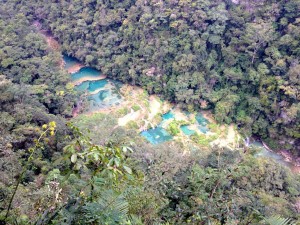
Semuc Champey. Photos don’t do it justice. Words won’t, but I’ll give it a shot.
I hiked for hours to get there, up mountain and down mountain, sweating rivers, fending off half-wild dogs with a stick. The backpacker kids took a truck.
At Semuc Champey, the Cahabón River comes roaring through a gorge, all white water, sharp rocks and death, until it reaches a crack in the earth, the entrance to a cave system stretching for miles, and to the Mayan underworld, Xibalba. Just past this hole in the world, where the river roars and snaps and crashes down into the dark to contend with the Lords of Death, a raised limestone ledge bridges the gorge, the cave system running beneath it. On the far side, the caves open up again, and out comes the river, still churning, but broader, purged by darkness of its power. Meanwhile, all these little rivulets and springs spill down the cliffs onto the ledge. Eventually they find the river, through water-eaten tunnels in limestone or by spilling off at either end in lace-threaded falls. But this has been happening for thousands of years, during which the springs have carved into the ledge dozens of clear, blue-green pools. The pools are utterly calm, full of little darting fish, orange and iridescent. Swallows dive, tropic orioles jabber. Mist falls in curtains. But as you lie there floating, somewhere beneath blue-green and stone the river roars through darkness.
I spent hours watching the river pour down into the underworld, every shred of thought I’d had in me being dragged down along with it. I spent hours in the pools, empty, dumbfounded by tranquility. And I spent hours at the mouth of the caves, feeling all those useless thoughts bubble up again into the world.
The backpacker kids splashed, screamed and flirted. I avoided them as best I could. There are all these little altars set up among stalagmites along the sides of the gorge—the ancient Maya considered this a sacred place, and it’s obvious the modern Kekchi still do. I understand the good tourism does, the money it brings, I do. The spring breakers had as much right to be here as I did. Still, if I had my way, this would be a place experienced in silence.
In the blue-black predawn of my second morning in Lanquín, yet another ancient, carbon-monoxide-coughing microbus awaited me outside the hostel under misty lowland rain, full of yet another crop of egomaniacal Americans. These were already mid-rant about how horribly they were being treated, and so attached to their personal space they refused even to consider squishing together to make room for me.
I couldn’t take it. Semuc Champey had purged all resentment from me, devoured it. I just wasn’t ready to fill myself up again.
So I let it out. I blew up at them, cursing them roundly and at length in English for their stupid selfish refusal to consider even for a second what life might be like for anyone outside their own skins, while simultaneously apologizing in Spanish to the driver and ayudante on behalf of my countrymen and white people everywhere. I told the driver to keep my non-refundable prepaid ticket money and drive on without me, just so he wouldn’t have to listen to any further whining. I told him I’d ride on the roof if it would appease the little monsters.
The ayudante smiled, thanked me, waved me off. This was his home; he dealt with this every day. And he was right. He held his ground a few minutes, tempers blew over, and impatience got the better of selfishness. The white kids made room. I was more than happy to scrunch myself up in a fetal position in the folding half-seat by the door, ignored by everyone, for the four hours to the crossroads outside Salamá. We stopped once for a bathroom break, and the driver came over to ask if I worked in Lanquín—as in, if I was something other than a tourist. I told him no; I was just a little bit less awful a tourist.
When I spilled out the door in Salamá, I found myself back in the cold, dusty highlands, a stiff wind blowing out of the east. It was barely ten. I thanked god I’d never see that particular crowd of white people again, dug a hoodie out of my bag, got breakfast from a wizened old lady at a comedor by the highway and caught the next chicken bus for Rabinal.
I was the only foreigner at the highway crossing; I was the only foreigner on the bus. The only white person I saw other than myself the whole day in Rabinal was a crazy drunk sunburned homeless guy sweeping up trash in the streets for tips. No adorable child laborers accosted me trying to sell me scarves or bum a quetzal. Nobody chased me down the street trying to get me into their cab or to buy an all-inclusive package tour to Tikal. I got stared at a little. A lot. But mostly I got ignored.
At first, after everything that preceded it, this was an enormous relief. After a few hours, it became a lesson in humility.
I’d come to Rabinal, a colonial town in a dusty valley centered around a big white Spanish-era church, in hopes of seeing Rabinal Achí, a prehispanic Mayan play, among the last of its kind, which the internet assured me would take place on January 25th, the feast day of the conversion of Saint Paul and the town’s annual fair. I’d been reading Dennis Tedlock’s English translation all week in preparation. According to Tedlock, the play would be performed on the steps of the church at dusk. As I stood overwhelmed in the steeple’s shadow in Rabinal’s market square—the tallest, palest person in a crowd of thousands—the director and his leading man happened by, comparing choreography notes. I didn’t want to interrupt; I was aware how out of place I was. This wasn’t my cultural heritage. Unlike Tedlock, I didn’t have decades’ study of Mayan languages and history to justify my jumping in with a bunch of stupid questions. I determined to be the least obnoxious Mayanist fanboy I could be. So I followed them discreetly, at a distance, into the back streets of Rabinal.
The street turned from cobbles to dust. A snoozing pig blinked and snorted laughter at the sight of me. In the distance, Red Mountain rose larger, the windworn ruins of the ancient Achí stronghold featured in the play just visible at its crest. Then my quarry turned through a chain-link gate into a building marked the Center for Achí Mayan Cultural Preservation. I guessed they were on their way to rehearse—I’d leave them alone.
Five hours til dusk, fourteen until the late-night bus left for the capital city and my flight home. What the hell was I supposed to do until then?
I wandered back streets until the weird looks got so weird I turned back. I wandered the fair, gawking, until I got exhausted from carrying my heavy bag. I ferreted out an unobtrusive place to sit awhile—not so easy. I people-watched. I couldn’t bring myself to take notes—too touristy, too obvious. I read my Tedlock ebook, cupping it in my hands or inside my hat so nobody would notice I’d been stupid enough to bring my fancy phone. I got bored and wandered the fair some more. I ate street food. I walked all the way to the pastel-colored graveyard at the far end of town; I walked back. I thought about finding a bar to hide in, decided that would be a copout. I ate more. I breathed wood smoke, incense, exhaust. My throat was dry. I drank a beer. Time crawled.
A pineapple cut into popsicle shape, dipped in powdered chiles and pepían, messy, delicious. Churros, Mexican style: deep-fried, fluted tubes of sugared dough, mmm! Storytellers. Endless ribbons of típico, the bright handmade cloth woven in patterns unique to the village where they’re made. Ferris wheels. Merry-go-rounds. Gambling games. A guy dressed as a coal miner, painted silver, pretending to be a statue. Mariachi. Live chickens for sale. Sacks of chiles. Tortilla with refried black beans, longaniza sausage and salsa borracha, ¡muy rica! Bootleg DVDs. A woman selling gout medicine, shouting into an ancient PA system that made her sound like the teacher from Charlie Brown.
I was going crazy. What the fuck was I doing here? Who was I kidding, trying to be some kind of ethnographer? I was just a lost tourist. Intentionally lost. Should I just find the bus stop and go? Where? I wasn’t about to sit in the airport for fourteen hours. Suck it up, loser. You did this to yourself.
Dusk fell. Fireworks above the steeple. Crazy electric-blue whirligigs like those blacklight tree spores from Avatar. I bought one. Families and old people sat on the church steps, a cart sold votive candles. The play showed no sign of commencing.
I climbed the church steps and went in, crossing myself, old habits. On either side of the altar, enormous rainbow-feathered parade floats carried statues of Saint Bartholomew and Saint Paul; candles guttered in endless ranks. My throat was dry.
I drank hot ponche de leche spiked with aguardiente. The lady who sold it to me explained that the Rabinal Achí was performed on the Friday before and the Monday following the fair, not during it. Of course. Not everybody here keeps the old religion; most are Catholic. Why would a prechristian ceremony be allowed to interrupt a Saint’s Day? Stupid internet. Stupid Tedlock. Stupid me.
It must have been on my twentieth despairing, listless lap of the market square that day, struggling to keep my eyes open, struggling to stay on my feet and avoid knocking anybody sprawling with my giant bag, that five tiny, adorable teenage girls looked up from a plastic patio table and started shouting and waving like I was their long-lost best friend. I smiled, waved, sank into a chair at the next table. Any excuse to put that fucking bag down. Any excuse to smile back at friendly face, to actually have a conversation with someone. So much for solitude. I was broken.
They sent over an emissary—they wanted me to join them for pizza. I said I’d eaten. She insisted. I said I’d sit and drink a coke. She said they wanted me to dance. I said I was a terrible dancer, and why would they want to dance with me anyway, I was twice their height, twice their age. I said I couldn’t leave my bag. She said it was marimba, not salsa, it was easy. They could teach me. One of them could take my bag while the others danced. She wouldn’t take no.
So I went with them.
What the fuck was going on? I’ve never danced with a stranger in my life. I’m an awkward wallflower. One of the first rules of traveling in Guatemala is common sense; objectively, Guatemala is not a safe place. Letting a stranger take my bag was incredibly unwise. But I wasn’t going to be able to squeeze into that crowd otherwise, pale, clumsy giant. So I let it happen. As I watched one girl fade into the crowd bent nearly double trying to hold my absurd backpack off the ground, I rationalized. What did it have in it I really needed? I had my passport, a little money, my phone. Let it go.
I danced with three girls in turn, as chastely and politely as I knew how, smiling and wiggling gamely, getting stared at now by absolutely everyone. The girls were dolled up in makeup, cute dresses and glistening black hair: a big night for them, a once-a-year party. They gave back my bag and led me again through the fair, asking a million questions, circling back to collect me when I got stuck. I kept wondering when it would go wrong, when they’d cold-cock me and take everything I had. We played some kind of santería bingo: scorpions, cowboys, spiders, death’s heads. We shot air guns at tin stars. We ate dulces, sweetened coconut pressed into blocks and dyed pink. We tried on sunglasses. We danced some more.
We went on the ferris wheel—somehow, I ended up on the ferris wheel with just one of them, the oldest, 19. She whispered in my ear her plans to move to the United States. She asked how much money I made. She asked if I’d consider marrying a Guatemalan girl. I told her I was married, but hypothetically, sure. She asked if I had brothers. We laughed. She asked for six thousand dollars to pay for immigration fees, then when I wouldn’t, for two thousand just to visit. I said no as gently as I could.
This, I perceived at last, was their scheme. Butter up the white guy, romance him into marrying one of us. A pretty clever plan, I thought. I told them so. How could I hold it against them, when they’d had every opportunity to rob me and leave me stranded? I worried for them. I worried that they’d try this on somebody more of an asshole than me, and they’d get hurt. I made her promise she’d never try making the crossing illegally, with a coyote. She agreed—coyotes, she told me, would rape you, then sell you. Exactly. She asked if I’d write a letter inviting her to visit. I said I would. And I will, if it can possibly help.
After all those swell-headed gringas with fat senses of entitlement where their personalities should be, to me these five adorable Achí teenagers were functionally miraculous. They were the nicest, most wholesome, happiest people I had met out of the blue in a long time, and they pulled me out of a pretty dark place in a way I could not possibly have imagined happening. Honestly, I hated to imagine them in the States, getting shat on by white people. I tried to explain this. But the cultural disconnect is wide, and it works both ways. And of course they’re right: In the U.S., even if they’d be less happy, they’d make more money. They could send it back here.
I was supposed to leave Rabinal at 3 AM. I’d planned to stay up, not to sleep. It had seemed silly to waste a hotel on four hours’ sleep—but by eleven, I was delirious, exhausted, and my throat had all but swollen shut. When they got all this out of me, two of the girls insisted I rest a few hours at their parents’ house that night.
They introduced me to their mother, their family. I was worried their brothers might want to kill me, what with me, a 34-year-old gringo, having just spent an evening with their teenage sisters on what was for all intents and purposes a date. Instead, they were just as excited to meet me as the girls had been, full of questions about the U.S., what it was like to live there, what people there thought of Guatemalans. I wished I had better answers. Their house was a rusted steel door, concrete walls, concrete floor polished warm gray-brown by how many years of foot traffic, a dirt courtyard in the middle open to the pure sky, a plastic drum with the lid cut off under a gutter pipe collecting rainwater. They peppered me with questions until after midnight, then arranged a cardboard pallet and some blankets on their kitchen floor.
Gratefully I stretched my absurdly enormous self out for a fitful two hours’ doze to the sounds of roosters, abuela’s snores, ranchero blaring from a radio across the street. I didn’t get much rest. My head spun trying to make sense of everything that had just happened, to get a little objectivity. There was none to be had. Clouds fled; Mayan constellations wheeled in the night. I felt like I’d fallen a long, long way, then been caught.
Eventually I got up, folded the blankets they’d given me, spent a furtive five minutes figuring out how to squeeze through the door without disturbing the wooden post they’d propped against it in place of a deadbolt, then stumbled back to catch my bus.
I don’t have much of a takeaway for you. I can’t say this experience has made me any better able to do justice to the people and the place I don’t think I can help but write about. Maybe a little. I’m still recovering from it. I didn’t break through to the bottom of my assumptions. I’m pretty sure they have no bottom. This is just the nature of the struggle.
By the time I made it home, my dry throat had blossomed into full-blown laryngitis. I still can’t speak. Penance not yet paid?
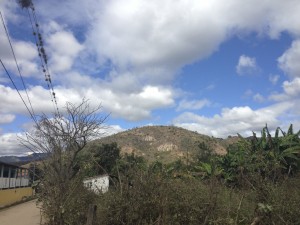
Red Mountain, crowned by the ruins of the ancient Achí stronghold, from a vacant lot northwest of Rabinal.


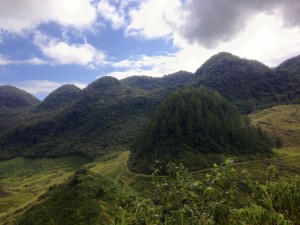
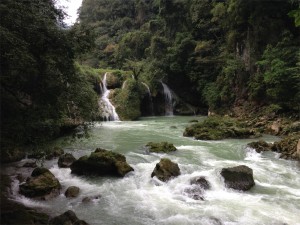
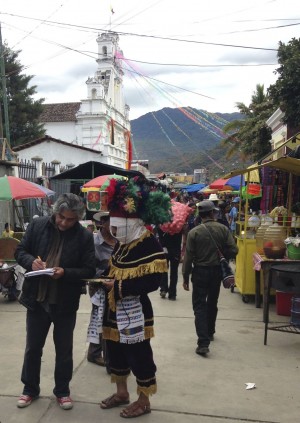
Seems like a perfect journey for a gringo, and what an adventure for those girls!
This line hooked me: “I’m trying to see through…to understand what it is to be born to the opposite of…things in a place I love because of them.”
You’ve captured something about the essence of humanity in the midst of pervasive injustice; it is neither tamed nor secured but you’ve drawn it into sight.
Yeah, I have dwelt on that line. Thank you.